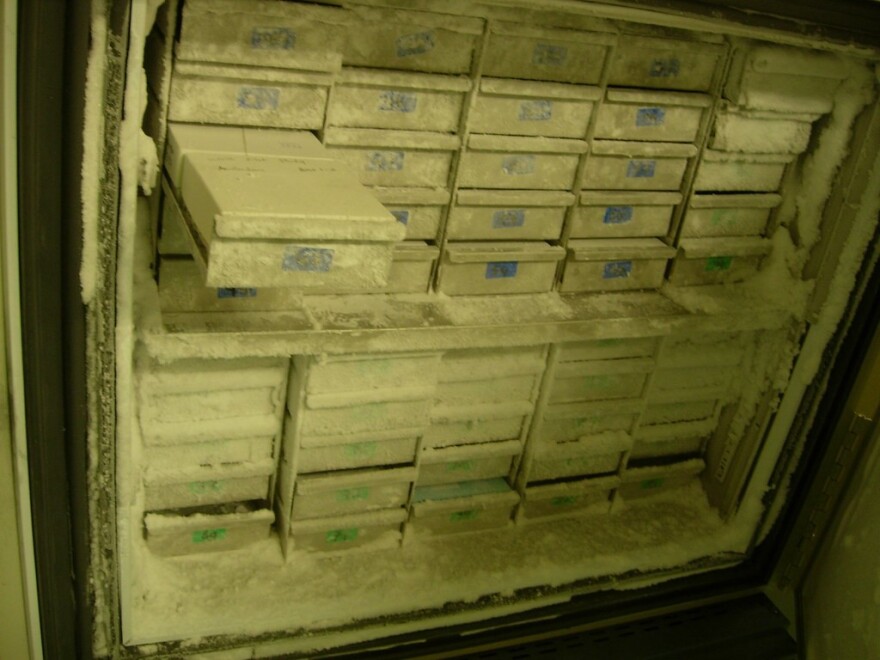Most scientific research happens in academic labs on university campuses or in research labs owned by private companies. These labs ask foundational scientific questions like: how big is an organisms’ genome or how fast does it replicate?
“Well, what I would really like to study is the antibody response and the maturity of the antibody response,” said Dr. Kim Jordan, an immunologist at the University of Colorado Anschutz campus in Denver who is helping to find answers about the virus’ unique behavior.
“But why is that inflammation not being resolved? Why is the virus infection continuing? And why are some people I’ve heard 30 days out still testing positive for COVID and still have the virus? Like what is different about this virus that our immune system can’t resolve it?” she asked.
To learn some basic biology about this new coronavirus, patient samples have to get into research labs. The University of Colorado Anschutz campus in Denver has a lab — the Human Immunology and Immunotherapy Lab — that was collecting samples from patients with cancer before the pandemic.
While the lab team was working from home in April, they had the idea to use the lab to collect and distribute samples from patients with COVID-19. Jordan is the assistant director of this project.
She said, “it was very clear early on, about two weeks into it that the researchers in our department — we’re in the department of immunology/microbiology. There were several basic science researchers here, so not ones that are doing patient care, but virologists and immunologists that are very interested in studying this disease for obvious reasons and wanted to create a cohort of patient samples so that they could do some basic science research on these samples.”
The lab is partnering with doctors they already have relationships with — some who even work at Children’s Hospital — to gain access to samples from all ages, which can often be challenging.
When a patient comes in with COVID-19, the doctor or nurse asks if they’d be willing to participate in the study. If the patient gives consent, a little extra sample material is taken and given to this lab.
The goal is to collect samples from all ages and demographics — even pregnant moms who get COVID-19.

The samples are catalogued and processed to not degrade. Research groups can apply to use a batch of samples to answer a specific question. For example, a research group could ask for samples from people who have similar ages and demographics but were either symptomatic or asymptomatic — to try and see the differences in the immune response of these cohorts.
Or they could focus on the molecular scale, inside a cell.
Scientists use what they call “omics” methods to scan all of the items in a cell that are of a certain type: like all proteins or all metabolites. It’s like if you asked for an inventory of all of the trees in a city and you got back the species and location of every tree.
For COVID, they’re calling it the “COVID-ome.”
Jordan explained, “you get millions of data points out of these types of assays and then people can go in and look for their gene of interest.
For genes, they call this the “genome.” For proteins, they call it the “proteome.” For metabolites, the “metabolome.” And for COVID, they’re calling it the “COVID-ome.”
Scientists could also look at how our immune system responds to the virus. Every virus is a little different. For example, some people report losing their sense of smell with this virus. These samples could provide a means to understanding the relationship between the virus and our immune system on this level.
“I always think about it from a clinical treatment standpoint,” Jordan said. “So, is there something that we can give patients to help them resolve the inflammation? There are many drugs that target inflammation in general and maybe some of those would be effective in helping their outcomes. But really, I want to know what’s going to help kill this virus.”
“But really, I want to know what’s going to help kill this virus.”
These are not the same samples as when you get tested for COVID-19. These are blood samples from people who have gone to the doctor while they had COVID-19. It’s closer to the kind of sample a doctor would take to test for antibodies.
The Human Immunology and Immunotherapy lab has collected a few hundred of the 500 total they’re aiming to collect by October. Additionally, they’re asking healthcare workers to donate samples every now and then to track immune responses in a highly exposed population.
The lab has already gotten many applications from researchers, and they’re sending out the first batch of samples to research labs at the beginning of August.






